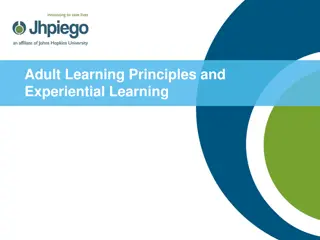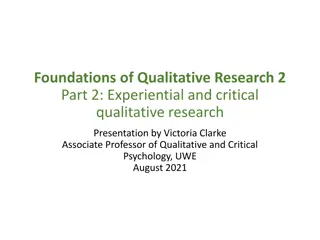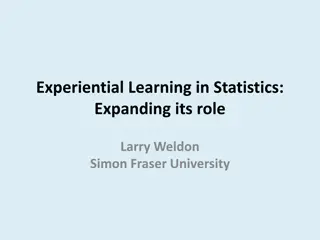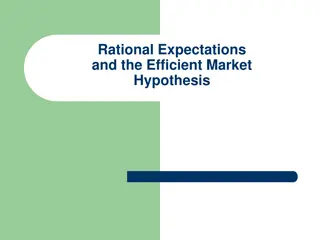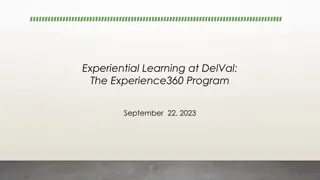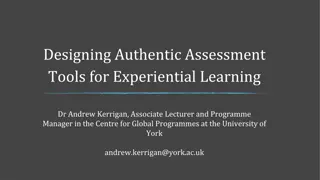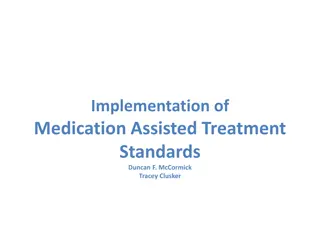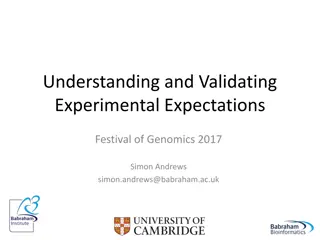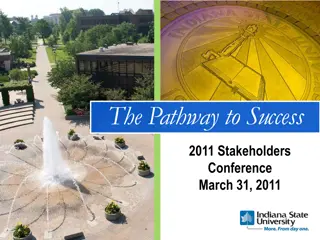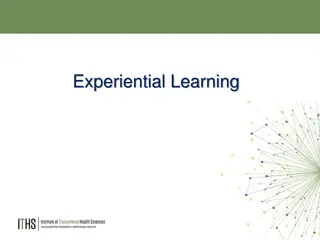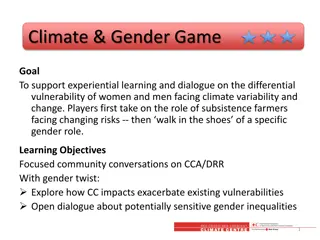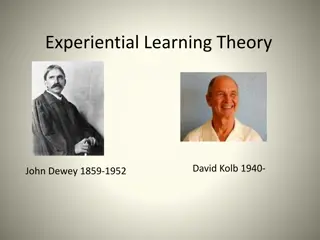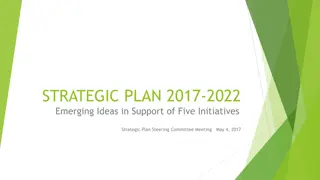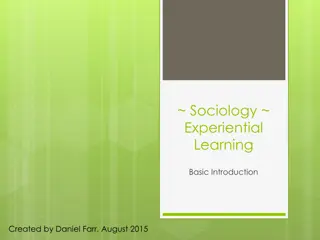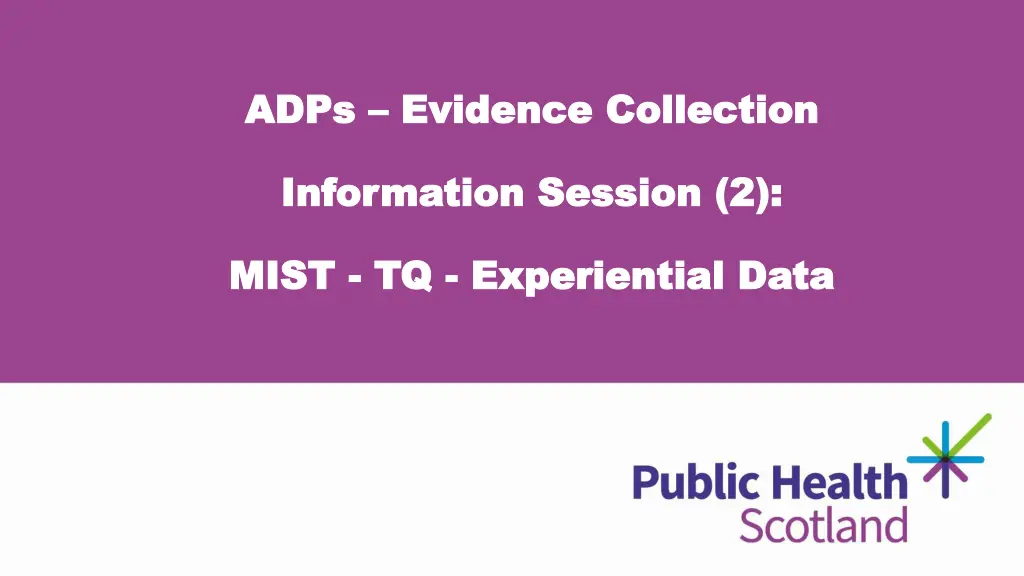
Evidence Collection and Prioritization for Assessment Process
Explore the detailed process of evidence collection, prioritization, and assessment for the upcoming months, including key training dates and data submission deadlines. Learn about the three stages involved in planning, collecting, and submitting evidence, with a focus on Process, Numerical, and Experiential data. Discover the main priorities for the next 3 months, such as utilizing existing data, establishing governance requirements, identifying interview teams, and planning for quality improvement. Stay updated with essential dates for training sessions and initial data submission.
Download Presentation

Please find below an Image/Link to download the presentation.
The content on the website is provided AS IS for your information and personal use only. It may not be sold, licensed, or shared on other websites without obtaining consent from the author. If you encounter any issues during the download, it is possible that the publisher has removed the file from their server.
You are allowed to download the files provided on this website for personal or commercial use, subject to the condition that they are used lawfully. All files are the property of their respective owners.
The content on the website is provided AS IS for your information and personal use only. It may not be sold, licensed, or shared on other websites without obtaining consent from the author.
E N D
Presentation Transcript
ADPs ADPs Evidence Collection Evidence Collection Information Session (2): Information Session (2): MIST MIST - - TQ TQ - - Experiential Data Experiential Data
Three stages: Planning, Collecting & Submitting. Specifically, evidence collection for: Process, Numerical & Experiential.
Process Step 1 = Evidence Plan/Priorities shared with ADPs (MIST to create, ADPs agreement) MAT Standard: 1 Numerical Self-Assessed RAG (July 2021) Expected RAG (April 2022) Experiential Step 2 = Collect the evidence (ADPs) (A guide being developed) Form 1 (Process) Step 3 = Record the evidence (ADPs) Form 2 (Numerical) Form 3 (Experiential) Step 4 = Summarise the information (MIST). RAG |Evidence based MAT1 Self RAG Exp RAG Process Experiential Narrative Recommendations Numerical Step 5 = Review summary evidence, actual RAG (MIST/ADPs). Step 1, 2 & 3: Completed (ADPs) by the end of March 2022 (25th).
February - March 2022 March 2022 Any existing data Experiential Summary Forms Summarises what is already collected/ new via MS forms/other The MIST summary for the assessment and RAG Other e.g. SDF New Data: MS Forms
The main priorities for the next 3 months 1. Identify work using experiential methods that has already taken place locally i.e. existing data to contribute to RAG status 2. Make contact with local governance/ethics departments (NHS/HSCP) and ensure information governance requirements are agreed/in place. 3. Identify interviewer teams and any existing capacity (e.g. recovery networks, social researchers in health/educational settings, practitioners). 4. Agree attendance at training dates 5. Identify priority areas for additional data collection between now and March 2022 6. Plan for how learning is fed back into quality improvement
KEY DATES FOR YOUR DIARY Training Dates Morning (9-12) Afternoon (1-4) Monday 14th Feb A A Friday 18th Feb A B Tuesday 22nd Feb B A The link to register for sessions will be shared with you to give to nominated trainers Thursday 24th Feb B A Monday 28th Feb A B Friday 4th March A B Tuesday 8th March A B Thursday 10th March B B Initial Data Submission: March 25th2022
MIST Here to support: Key Contacts MIST Team Principal Lead Role Contact (email) Contact (number) Project Specification Documents (PSDs) Duncan McCormick & Tracey Clusker Advisors duncan.mccormick@phs.scot / tracey.clusker2@phs.scot Process Liz Taylor Project Manager elizabeth.taylor9@phs.scot Numerical Kerry Humphries Principal Information Analyst kerry.humphries2@phs.scot Experiential Dermot Craig & Michelle Buchanan National Officer/s dermot@scottishrecoveryconsortium.org Michelle@scottishrecoveryconsortium.org 07751 213108 07938 684351 Criminal Justice System Liz Taylor & Jessica Davidson Project Manager - Prisons Clinical Nurse Lead Police Custody Nurse Consultant elizabeth.taylor9@phs.scot jessica.davidson2@nhs.scot Process, Clinical/QI Tracey Clusker tracey.clusker2@phs.scot
ADP Aberdeen TEAM Q RESPONSIBLE MEMBER ADP Highland TEAM Q RESPONSIBLE MEMBER Dermot Craig Dermot Craig Aberdeenshire/Moray Inverclyde Dermot Craig Michelle Buchanan Angus Mid/East Lothian Dermot Craig Dermot Craig Argyll & Bute North Ayrshire Michelle Buchanan Michelle Buchanan Borders North Lanarkshire Michelle Buchanan Michelle Buchanan Cl/Strl/Fk Orkney Michelle Buchanan Dermot Craig D&G Perth & Kinross Michelle Buchanan Dermot Craig Dundee Renfrewshire Dermot Craig Michelle Buchanan East Ayrshire Shetland Michelle Buchanan Dermot Craig East Dunbartonshire South Ayrshire Michelle Buchanan Dermot Craig East Renfrewshire South Lanarkshire Michelle Buchanan Michelle Buchanan Edinburgh West Dunbartonshire Dermot Craig Michelle Buchanan Fife West Lothian Dermot Craig Dermot Craig Glasgow Western Isles Michelle Buchanan Dermot Craig
Additional Support ADPs can expect support from the MAT Standards Implementation Support Team (MIST) and the Scottish Recovery Consortium (SRC) with regards to: Support for methodology i.e. MS Forms, adaptations and development, interview schedule etc. Training programme for interviewer teams, along with materials and resources Provision of ongoing support and advice for people carrying out interviews Support to build local capacity that ensures the learning translates into intent and action FAQs and feedback forms will be distributed following the information session


